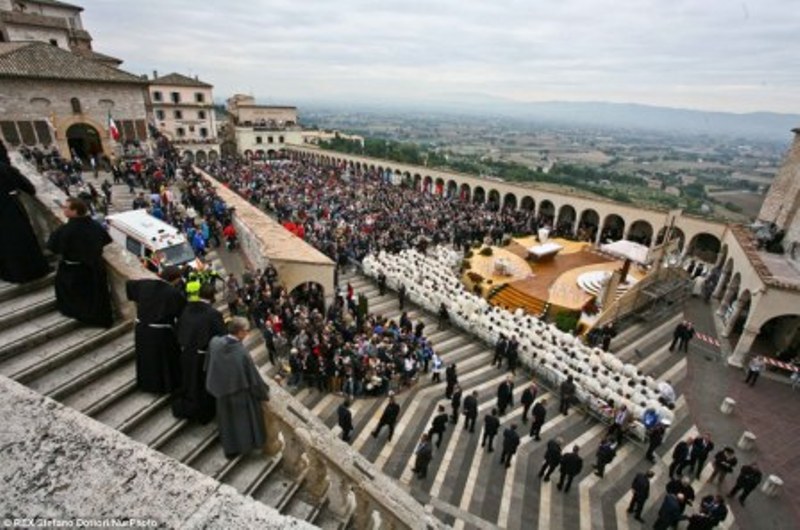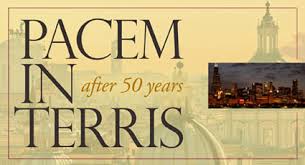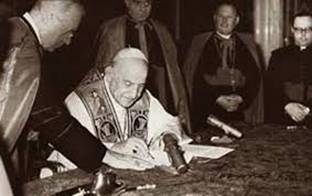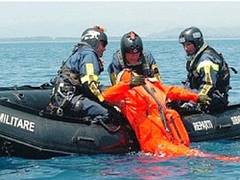Nov 2013 - two - abbey
Main menu:
- Home Page
- Abbey
- Apiary
- Documents
- Monastic
- Spirituality
- Apostleship of the Sea
- Homilies of Pope Francis
Nov 2013 - two
9. Papal Mass draws thousands in Assisi
Pope Francis called for an end to armed conflict and clarified the notion of Franciscan peace during the Mass he presided for the feast of St. Francis on Friday in Assisi. A few thousand people gathered for the late morning celebration in St. Francis Square, situated before the world-
The Pope celebrated at a simple altar, behind which stood a giant two-
“His first and most essential witness is this: that being a Christian means having a living relationship with the person of Jesus; it means putting on Christ, being conformed to him,” he said.
“Where did Francis’ journey to Christ begin? It began with the gaze of the crucified Jesus,” he said. “With letting Jesus look at us at the very moment that he gives his life for us and draws us to himself. …When we let the crucified Jesus gaze upon us, we are re-
NOT A PANTHEISTIC PEACE
St. Francis also teaches “that everyone who follows Christ receives true peace”, which only Christ can give and the world cannot. Many people associate St. Francis with peace, however their understanding of this peace is not profound. “Franciscan peace is not something saccharine,” he said emphatically. “Hardly! That is not the real St. Francis! Nor is it a kind of pantheistic harmony with forces of the cosmos… That is not Franciscan either,” he continued to applause. “It is a notion some people have invented!
“The peace of St. Francis is the peace of Christ, and it is found by those who ‘take up’ their ‘yoke’, namely, Christ’s commandment: Love one another as I have loved you. This yoke cannot be borne with arrogance, presumption or pride, but only with meekness and humbleness of heart,” he said.
RESPECT FOR LIFE
Finally, he said, St. Francis “bears witness to the need to respect all that God has created, and that men and women are called to safeguard and protect, but above all he bears witness to respect and love for every human being.” …“From this City of Peace, I repeat with all the strength and the meekness of love: Let us respect creation, let us not be instruments of destruction! Let us respect each human being,” he said.
He called for an end to armed conflict and for care for those who are suffering and dying because of violence, terrorism or war in the Holy Land, in Syria, throughout the Middle East and worldwide. He concluded by petitioning St. Francis to obtain the gift of God’s harmony and peace for the world. Before the final blessing, a special votive lamp, dedicated to St. Francis and filled with oil from the local region, was lit. The Pope then prayed a special prayer for Italy, of whom St. Francis is the patron.
Below the Pope's prepared English text of his Homily:
I give you thanks, Father, Lord of heaven and earth, for you have hidden these things from the wise and understanding, and revealed them to babes” (Mt 11:25). Peace and all good to each and every one of you! With this Franciscan greeting I thank you for being here, in this Square so full of history and faith, to pray together.
Today, I too have come, like countless other pilgrims, to give thanks to the Father for all that he wished to reveal to one of the “little ones” mentioned in today’s Gospel: Francis, the son of a wealthy merchant of Assisi. His encounter with Jesus led him to strip himself of an easy and carefree life in order to espouse “Lady Poverty” and to live as a true son of our heavenly Father. This decision of Saint Francis was a radical way of imitating Christ: he clothed himself anew, putting on Christ, who, though he was rich, became poor in order to make us rich by his poverty (cf. 2 Cor 8:9). In all of Francis’ life, love for the poor and the imitation of Christ in his poverty were inseparably united, like the two sides of a coin.
What does Saint Francis’s witness tell us today? What does he have to say to us, not merely with words – that is easy enough – but by his life?
1. His first and most essential witness is this: that being a Christian means having a living relationship with the person of Jesus; it means putting on Christ, being conformed to him. Where did Francis’s journey to Christ begin? It began with the gaze of the crucified Jesus. With letting Jesus look at us at the very moment that he gives his life for us and draws us to himself. Francis experienced this in a special way in the Church of San Damiano, as he prayed before the cross which I too will have an opportunity to venerate. On that cross, Jesus is depicted not as dead, but alive! Blood is flowing from his wounded hands, feet and side, but that blood speaks of life. Jesus’ eyes are not closed but open, wide open: he looks at us in a way that touches our hearts. The cross does not speak to us about defeat and failure; paradoxically, it speaks to us about a death which is life, a death which gives life, for it speaks to us of love, the love of God incarnate, a love which does not die, but triumphs over evil and death. When we let the crucified Jesus gaze upon us, we are re-
We turn to you, Francis, and we ask you: Teach us to remain before the cross, to let the crucified Christ gaze upon us, to let ourselves be forgiven, and recreated by his love.
2. In today’s Gospel we heard these words: “Come to me, all who labour and are heavy laden, and I will give you rest. Take my yoke upon you and learn from me, for I am gentle and lowly in heart” (Mt 11:28-
Franciscan peace is not something saccharine. Hardly! That is not the real Saint Francis! Nor is it a kind of pantheistic harmony with forces of the cosmos… That is not Franciscan either; it is a notion some people have invented! The peace of Saint Francis is the peace of Christ, and it is found by those who “take up” their “yoke”, namely, Christ’s commandment: Love one another as I have loved you (cf. Jn 13:34; 15:12). This yoke cannot be borne with arrogance, presumption or pride, but only with meekness and humbleness of heart. We turn to you, Francis, and we ask you: Teach us to be “instruments of peace”, of that peace which has its source in God, the peace which Jesus has brought us.
3. “Praised may you be, Most High, All-
Finally, I cannot forget the fact that today Italy celebrates Saint Francis as her patron saint. The traditional offering of oil for the votive lamp, which this year is given by the Region of Umbria, is an expression of this. Let us pray for Italy, that everyone will always work for the common good, and look more to what unites us, rather than what divides us. I make my own the prayer of Saint Francis for Assisi, for Italy and for the world: “I pray to you, Lord Jesus Christ, Father of mercies: Do not look upon our ingratitude, but always keep in mind the surpassing goodness which you have shown to this City. Grant that it may always be the home of men and women who know you in truth and who glorify your most holy and glorious name, now and for all ages. Amen.”
10. Pope, cardinal advisers looking at major overhaul of Roman Curia
Regarding Blessed John Paul II's 1988 constitution "Pastor Bonus," on the running of the central government of the Catholic Church in the Vatican and its relations with the universal Church, Father Lombardi said the pope and the cardinals emphasized the role of the Secretariat of State as "the secretariat of the pope," and said the discussions included "the hypothesis of a new figure -
The eight cardinals -
Pope Francis has asked his eight cardinal advisers for counsel on the Vatican's finances, as well, Father Lombardi said, but the theme was not treated in depth at the October meeting because Pope Francis also appointed several special commissions to look into specific aspects of the Vatican's finances, budgeting process and the Vatican bank and those commissions are still at work.
The Council of Cardinals is expected to meet again in January or February, Father Lombardi said, and to continue corresponding with each other and with Pope Francis in the meantime. The eight members, who represent six continents, are: Cardinals Francisco Javier Errazuriz Ossa, retired Archbishop of Santiago, Chile; Oswald Gracias of Bombay, India; Reinhard Marx of Munich and Freising, Germany; Laurent Monsengwo Pasinya of Kinshasa, Congo; Sean P. O'Malley of Boston; George Pell of Sydney; Giuseppe Bertello, president of the Governatorate of Vatican City StateVatican City State; and Oscar Rodriguez Maradiaga of Tegucigalpa, Honduras, president of Caritas Internationalis, the worldwide confederation of national Catholic charities.
11. Pope Francis: Pacem in Terris a guide for a better, peaceful world Experts from Catholic universities and institutions, and from the UN, the Council of Europe, the African Union, and the Organization of American States have gathered in Rome at the request of the Pontifical Council for Justice and Peace to discuss the relevance of Pacem in Terris in the promotion today of a more peaceful world.
Experts from Catholic universities and institutions, and from the UN, the Council of Europe, the African Union, and the Organization of American States have gathered in Rome at the request of the Pontifical Council for Justice and Peace to discuss the relevance of Pacem in Terris in the promotion today of a more peaceful world.
In his remarks Thursday, October 3, the second day of the conference, Pope Francis recalled John XXIII’s 1962 radio message calling for ‘peace, peace!’ as world powers came to the brink of nuclear war. And later, Blessed Pope John Paul II’s efforts at the time of the Iron Curtain which led to “an opening of spaces of freedom and dialogue.” John XXIII’s seeds of peace brought fruits, the Pope said, but despite “the fall of walls and barriers, the world continues to need peace” and Pacem in Terris remains extremely relevant. The Encyclical, Pope Francis said, reminds us that the basis of peace-
The Encyclical, Pope Francis said, reminds us that the basis of peace-
And if man, and indeed, society and authorities themselves share a common divine origin, then every human being shares a common dignity “to promote, respect and safeguard always.” Priority national and international action, said the Pope, must work towards a world where everyone is able “to effectively access food, water, shelter, health care, education and (be given) the possibility to form and support a family.” Lasting peace for all depends on it. It is not the Church’s job to indicate solutions to complex social issues which should be “left to free discussion,” Pope Francis said, noting that John XXIII’s call for peace in 1962 was an attempt to “orient the international debate” according to the virtues of “dialogue, listening, patience, respect of the other, sincerity and even an openness to reconsidering one’s own opinion.”
The Pope urged participants to seek guidance from Pacem in Terris as they discuss the challenges to peace today: what he described as an “educational emergency,” “the impact of the mass media on consciences, access to the earth’s resources,” the ethical use of biological research, “the arms race and national and international security measures.” The current world economic crisis, which the Pope called “a grave symptom of the disrespect for man and for truth with which Governments and citizens make decisions” is just another example of what needs to be fixed in an equitable way for lasting world peace to succeed.
Are we prepared to meet the challenge posed by Pacem in Terris? He wondered. As if in answer to his own question, Pope Francis described the world economic crisis as “inhuman” and expressed his deep sorrow for the latest maritime tragedy off the coast of the Italian island of Lampedusa in which many refugees lost their lives. Calling today’s tragedy “shameful”, he asked everyone to renew “our efforts to ensure that such tragedies are not repeated.”
12. Pope Francis offers prayers for victims of Lampedusa boat sinking Pope Francis visited Lampedusa, his first trip as Pontiff outside Rome, in July. The small Italian island and its migrants’ centre is the first port of call for scores of migrants arriving in Italy from all over the world. Monsignor Francesco Montenegro, archbishop of Agrigento and president of the CEI for Migration, said: “This is news that gives rise to feelings of sadness and outrage because we cannot continue to count the dead as if we were simply witnesses. The stories of people who make the trip, as the Pope said when he visited Lampedusa, are stories that are intertwined with ours.”
Pope Francis visited Lampedusa, his first trip as Pontiff outside Rome, in July. The small Italian island and its migrants’ centre is the first port of call for scores of migrants arriving in Italy from all over the world. Monsignor Francesco Montenegro, archbishop of Agrigento and president of the CEI for Migration, said: “This is news that gives rise to feelings of sadness and outrage because we cannot continue to count the dead as if we were simply witnesses. The stories of people who make the trip, as the Pope said when he visited Lampedusa, are stories that are intertwined with ours.”
13. Pope Francis: Women called to service, not servitude
Pope Francis on Saturday, October 12, spoke about “the vocation and the mission” of women, when addressing participants of a study seminar organized by the Women’s Section of the Pontifical Council for the Laity on the 25th anniversary of Blessed Pope John Paul II’s Apostolic Letter Mulieris Dignitatem. The letter was the first in papal teaching dedicated entirely to the theme of the woman, and the study seminar in particular discussed the point which says that God entrusts man, the human being, to woman in a special way.
“What does this ‘special entrusting’…of the human being to woman signify? It seems evident to me that my predecessor is referring to maternity,” said Pope Francis. “Many things can change and have changed in our cultural and social evolution, but the fact remains that it is the woman who conceives, carries in her womb and gives birth to the children of men,” the Pope continued. “And this is not simply a biological matter, but carries a wealth of implications for the woman herself, for her way of being, for her relationships, for the way in which we lend respect to human life and to life in general. Calling a woman to maternity, God entrusted the human being to her in an altogether special manner.”
The Pope warned that there are two dangers always present when speaking about this topic, calling them “two extreme opposites that destroy woman and her vocation. The first is to reduce maternity to a social role, to a task, albeit noble, but which in fact sets the woman aside with her potential and does not value her fully in the building of community. This is both in the civil sphere and in the ecclesial sphere,” explained the Holy Father. “And, in reaction to this, there is the other danger in the opposite direction, that of promoting a type of emancipation which, in order to occupy spaces taken away from the masculine, abandons the feminine with the precious traits that characterize it.”
Pope Francis also spoke about the special gifts given to women in the Church. “I would like to underline how the woman has a particular sensitivity for the ‘things of God’, above all in helping us to understand the mercy, tenderness and love that God has for us,” he said. “And it pleases me to think that the Church is not ‘il Chiesa’ [‘the Church’, masculine]: it is ‘la Chiesa’ [feminine]. The Church is a woman! The Church is a mother! And that’s beautiful, eh? We have to think deeply about this.”
The Pope said the document Mulieris Dignitatem arises in this context and offers a profound, organic reflection, with a solid anthropological base, enlightened by Revelation. “From here, we must restart that work of deepening and of promoting, for which I have already hoped many times. Even in the Church, it is important to ask oneself: what presence does the woman have?” he said.
“I suffer – speaking truthfully! – when I see in the Church or in some ecclesial organizations that the role of service that we all have, and that we must have -
14. President Obama “hugely impressed” by Pope Francis’s public statements
Pope Francis has “incredible humility, an incredible sense of empathy to the least of these, to the poor,” the president said. “And he's also somebody who's, I think, first and foremost, thinking about how to embrace people as opposed to push them away, how to find what's good in them as opposed to condemn them.”
The pope has made recent comments arguing that the Catholic Church should focus on more than just a few hot-
15. Pope’s Harley-
The Harley- Two Harley-
Two Harley-